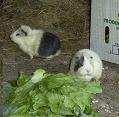 |
Bungala Ridge Permaculture Gardens REDUCE ... REUSE ... RECYCLE ... REPAIR ... RETURN ... REVEGETATE ... REPLENISH |
||||||||
|
|||||||||
|
|
Personal Empowerment Through A Permaculture Lifestyle "The world belongs to those who give it greatest hope" (Teillard de Chardin) Our first introduction to permaculture principles and practices was amazingly empowering. It gave us hope that solutions to the world's most pressing problems could be found, and that individuals could do something positive and immediate to make a difference. The permaculture course that we did helped to make us feel that the popular slogan "think globally, act locally" was much more than a catchy phrase - it was achievable. Empowerment has been described as increasing self-esteem, assertiveness, self-actualisation and a feeling of control over one's life rather than a state of dependency. Learning about permaculture has definitely inspired me and given me hope. I'm enthusiastic and optimistic about achieving my goals. The practical advice and help I get from my permaculture friends keeps me pointed in immediately useful directions. This feeling of empowerment, hope and optimism is one that I want to share with others so that individually and together we can build communities that sustain the Earth and value nature. Permaculture has enabled me to see my life and contribution to the earth's environment and my community on a much broader scale. I know other people feel the same way. In two decades permaculture has grown into a worldwide movement with representation in at least eighteen countries on six continents.In her thesis on permaculture and personal empowerment Caroline Smith investigates the underlying reasons for this phenomena. She lists dependency as a major factor - that we live in a dependent society, where our democracy representative rather than participatory, vesting power in representatives over whom we have little real influence. Our basic needs are determined by others and supplied to us, rather than obtained by us. We play a largely inactive and separated role, consumers rather than creators. Coupled with this dependency is an all pervasive sense of pessism and foreboding, leading to apathy. We live in a society which is affluent in material terms but increasingly impoverished in environmental and social terms. Our lives are highly stressful; we experience a growing sense of social isolation. Our penchant for over-consumption has led to environmental destruction on a vast scale worldwide. We feel trapped in jobs that don't nourish the soul or the planet and add to the general malaise of destruction, but feel powerless to do anything about. Dependency is disempowering, and results from a feeling of not being in control. Depression is now the fourth most debilitating community disease. It seems that a affluence, the desire and envy of billions of people in the developing world, is not synonymous with a high quality life after all. With daily activities reduced to a mere economic rationale life has lost much of its meaning for many people. The daily grind to earn money to pay the bills is what drives most people - and most are desperately unhappy, filling their non-productive time with mindless distraction of the entertainment industry. Such a narrow view of human beings is deadening and dispiriting. It denies much of what we know is deeply and fundamentally important to us - our connection with each other and with the natural world. We know that in order to survive, we need to change to more sustainable and human centred ways of living. I find permaculture provides the vision, ethical base and practical means to achieve this. All too often education on environmental and social issues adds to the growing sense of depression and hopelessness. This is because issues and problems are presented without offering positive insights, actions or techniques into ways forward. In sharp contrast, through permaculture education we learn to take back power into our lives; we become empowered through achievable actions in an ethical and, for some, a spiritual framework. Permaculture gives us the tools for personal action to take back our sense of control, whether it be growing food or growing community. It allows us to start where we are, be it the window box in the city, the back door or the large farm. We don't need formal qualifications to get started - information about permaculture is widely available. You start where you are at, from the centre out, starting small and simple, naturally growing complexity as you go. For many of us this begins in the home. David Holmgren believes that the home represents a crucible for experiments in redefining our relationships with each other and with nature. Caroline Smith says "permaculture is human centred, not techno-centred. It is a positive rather than negative response to, and critique, of the social and economic crisis. It operates at the human scale while keeping in mind the global picture. Permaculture offers a holistic, transformative view of thinking about the way we live. It gives us the means to re-examine and renegotiate our practices and relationships with each other, our communities and nature herself. It frees our minds from the limitations of the present and opens up a natural but often untapped creative energy to construct a sane, flowing, harmonious way of living our lives." Permaculture empowers - it gives back control over those basic aspects of life in a way that is achievable. A high standard of living is replaced by a high quality of life involving a renewed sense of belonging, be it in the community, with like-minded others, or to the earth itself. Permaculture gives people both a vision and the practical means to take back control into their personal lives, generating in turn a renewed sense of hope and purpose for the future. It gives us the means to move towards a sustainable world. To read more about Caroline's thesis and ideas on empowerment and spiritual growth through permaculture visit IPC - VI Conference Proceedings: The Getting Of Hope: Personal Empowerment Through Permaculture
|
Hot Links!
This site is sponsored by
|
|||||||
|
|
|
|
|||||||




